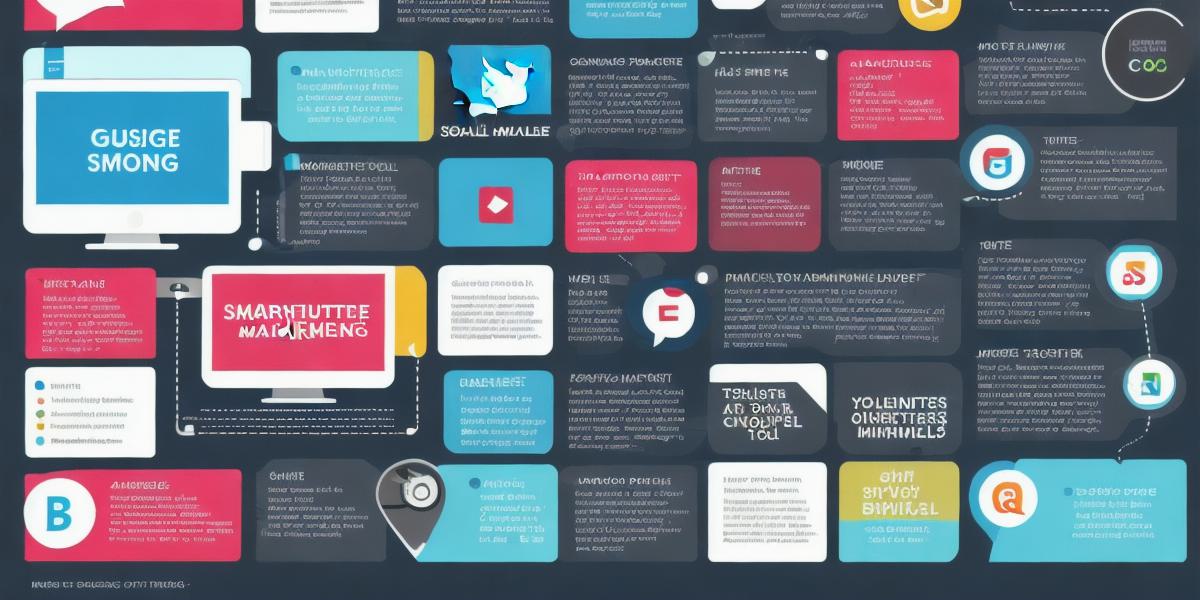Introduction:
Lead generation is an essential aspect of any marketing strategy. In today’s digital era, businesses need to generate high-quality leads efficiently and effectively to remain competitive. With the right marketing tools, businesses can automate their lead generation processes, increase the efficiency of their sales teams, and ultimately improve their bottom line. In this comprehensive guide, we will discuss the top marketing tools for lead generation in 2021, along with their features, benefits, and best practices for using them effectively.
Table of Contents:
I. The Importance of Lead Generation
A. Benefits of Generating High-Quality Leads
B. Challenges Faced by Businesses in Lead Generation
C. How to Create an Effective Lead Generation Strategy
II. Top Marketing Tools for Lead Generation
A. 1. HubSpot
B. 2. Salesforce
C. 3. Marketo
D. 4. Pardot
E. 5. Act-On
F. 6. Eloqua
G. 7. Microsoft Dynamics 365
H. 8. Zoho Campaign Manager
I. Comparison of the Top Marketing Tools for Lead Generation
III. Best Practices for Using Lead Generation Tools Effectively
A. Setting Clear Goals and Objectives
B. Defining Your Ideal Customer
C. Creating Compelling Content
D. Optimizing Your Landing Pages
E. Implementing A/B Testing
F. Integrating With Other Tools
G. Measuring and Analyzing Results
H. Tips for Effective Lead Nurturing
I. Thoughts on the Future of Lead Generation
Summary:
In conclusion, lead generation is a crucial aspect of any marketing strategy. By using the right tools and following best practices, businesses can generate high-quality leads efficiently and effectively. From automating lead capture to nurturing leads, the top marketing tools for lead generation in 2021 offer a range of features and benefits that can help businesses take their lead generation efforts to the next level. So, whether you’re just starting out or looking to improve your existing processes, this comprehensive guide will help you make informed decisions about the best marketing tools for lead generation in 2021.
I. The Importance of Lead Generation:
A. Benefits of Generating High-Quality Leads
:
High-quality leads are essential for any business that wants to grow and succeed. When businesses generate high-quality leads, they have a higher chance of converting them into paying customers. Additionally, high-quality leads can help businesses save time and resources by eliminating unqualified or low-value leads. Here are some benefits of generating high-quality leads:

* Increased ROI: High-quality leads are more likely to convert into paying customers, resulting in a higher return on investment for businesses.
* Improved Sales Efficiency: When businesses have a clear understanding of their ideal customer, they can create targeted marketing campaigns that resonate with them, resulting in fewer sales calls and more qualified leads.
* Cost Savings: Eliminating unqualified or low-value leads can save businesses time and resources, allowing them to focus on the most promising leads and increase their chances of success.
B. Challenges Faced by Businesses in Lead Generation
:
Lead generation can be challenging for businesses, especially in today’s digital era where consumers are bombarded with advertising and marketing messages. Here are some challenges that businesses face in lead generation:
* Overcoming Ad Blindness: With so much advertising and marketing content available online, it can be difficult to capture the attention of potential leads. Businesses need to find creative ways to stand out from the competition and capture their audience’s attention.
* Identifying Quality Leads: It can be challenging to determine which leads are qualified and ready to convert into paying customers. Businesses need to have a clear understanding of their ideal customer, create targeted marketing campaigns, and use lead scoring tools to identify high-quality leads.
* Managing Leads Effectively: Once businesses have generated high-quality leads, they need to effectively manage them through the sales process. This requires efficient communication, timely follow-up, and effective lead nurturing.
C. How to Create an Effective Lead Generation Strategy
:
Creating an effective lead generation strategy requires a clear understanding of your business goals and target audience. Here are some steps to help businesses create an effective lead generation strategy:
1. Define Your Ideal Customer: To create an effective lead generation strategy, you need to have a clear understanding of your ideal customer. This includes demographics, interests, pain points, and motivations.
2. Create Compelling Content: Once you know who your ideal customer is, you can create content that resonates with them. This can include blog posts, videos, e-books, webinars, and more.
3. Optimize Your Landing Pages: Effective landing pages are essential for lead generation. They should be optimized for conversions, include clear calls to action, and provide valuable information that addresses your target audience’s pain points.
4. Implement A/B Testing: A/B testing can help businesses optimize their marketing campaigns by testing different variations of headlines, images, copy, and other elements to see which ones resonate best with your target audience.
5. Integrate With Other Tools: Effective lead generation requires integrating with other tools such as CRM systems, email marketing software, social media platforms, and more.
6. Measure and Analyze Results: To create an effective lead generation strategy, businesses need to measure and analyze their results regularly. This includes tracking website traffic, conversion rates, lead scoring, and more.
7. Thoughts on the Future of Lead Generation: The future of lead generation is likely to be driven by technology and data analytics. As businesses continue to collect and analyze more data, they will be able to create more targeted and personalized marketing campaigns that resonate with their target audience.
II. Top Marketing Tools for Lead Generation
:
A. 1. HubSpot
: HubSpot is a comprehensive inbound marketing and sales platform that offers a range of tools for lead generation, including lead capture forms, landing pages, email marketing, and social media integration. HubSpot’s lead scoring tool can help businesses identify high-quality leads based on their behavior, interests, and demographics.
B. 2. Salesforce
: Salesforce is a popular CRM system that offers a range of tools for lead generation, including lead capture forms, email marketing, and social media integration. Salesforce’s lead scoring tool can help businesses identify high-quality leads based on their behavior, interests, and demographics.
C. 3. Marketo
: Marketo is a marketing automation platform that offers a range of tools for lead generation, including lead capture forms, email marketing, and social media integration. Marketo’s lead scoring tool can help businesses identify high-quality leads based on their behavior, interests, and demographics.

D. 4. Pardot
: Pardot is a B2B marketing automation platform that offers a range of tools for lead generation, including lead capture forms, email marketing, and social media integration. Pardot’s lead scoring tool can help businesses identify high-quality leads based on their behavior, interests, and demographics.
E. 5. Act-On
: Act-On is a marketing automation platform that offers a range of tools for lead generation, including lead capture forms, email marketing, and social media integration. Act-On’s lead scoring tool can help businesses identify high-quality leads based on their behavior, interests, and demographics.
F. 6. Zoho Campaigns: Zoho Campaigns is a marketing automation platform that offers a range of tools for lead generation, including lead capture forms, email marketing, and social media integration. Zoho Campaigns’ lead scoring tool can help businesses identify high-quality leads based on their behavior, interests, and demographics.
G. 7. Infusionsoft: Infusionsoft is a comprehensive CRM system that offers a range of tools for lead generation, including lead capture forms, email marketing, and social media integration. Infusionsoft’s lead scoring tool can help businesses identify high-quality leads based on their behavior, interests, and demographics.
III. Comparison of Marketing Tools for Lead Generation:
A. HubSpot vs Salesforce: Both HubSpot and Salesforce are popular CRM systems that offer a range of tools for lead generation. HubSpot is more focused on inbound marketing and offers a comprehensive suite of tools, while Salesforce is more focused on sales automation.
B. Marketo vs Pardot: Both Marketo and Pardot are marketing automation platforms that offer a range of tools for lead generation. Marketo is more focused on B2B marketing, while Pardot is more focused on B2B sales automation.
C. Act-On vs Zoho Campaigns: Both Act-On and Zoho Campaigns are marketing automation platforms that offer a range of tools for lead generation. Act-On is more focused on small business marketing, while Zoho Campaigns is more focused on enterprise marketing.
D. Infusionsoft vs HubSpot: Both Infusionsoft and HubSpot are comprehensive CRM systems that offer a range of tools for lead generation. Infusionsoft is more focused on small business marketing, while HubSpot is more focused on inbound marketing.
IV.
Summary:
Effective lead generation requires a clear understanding of your business goals and target audience. To create an effective lead generation strategy, businesses need to use the right tools, measure and analyze their results regularly, and continuously optimize their campaigns based on data analytics.




